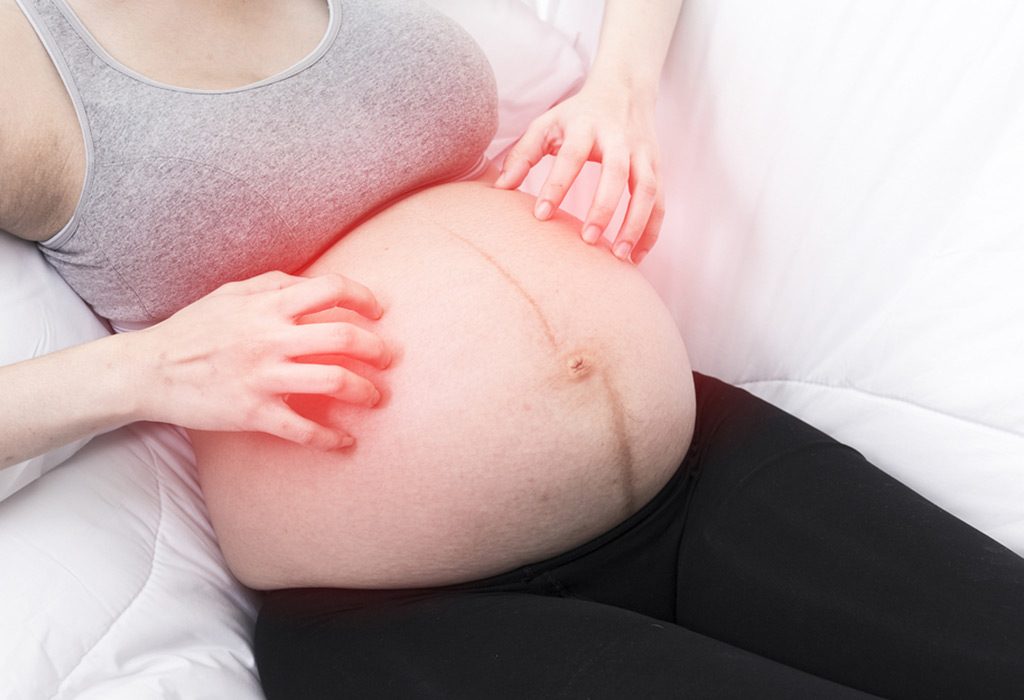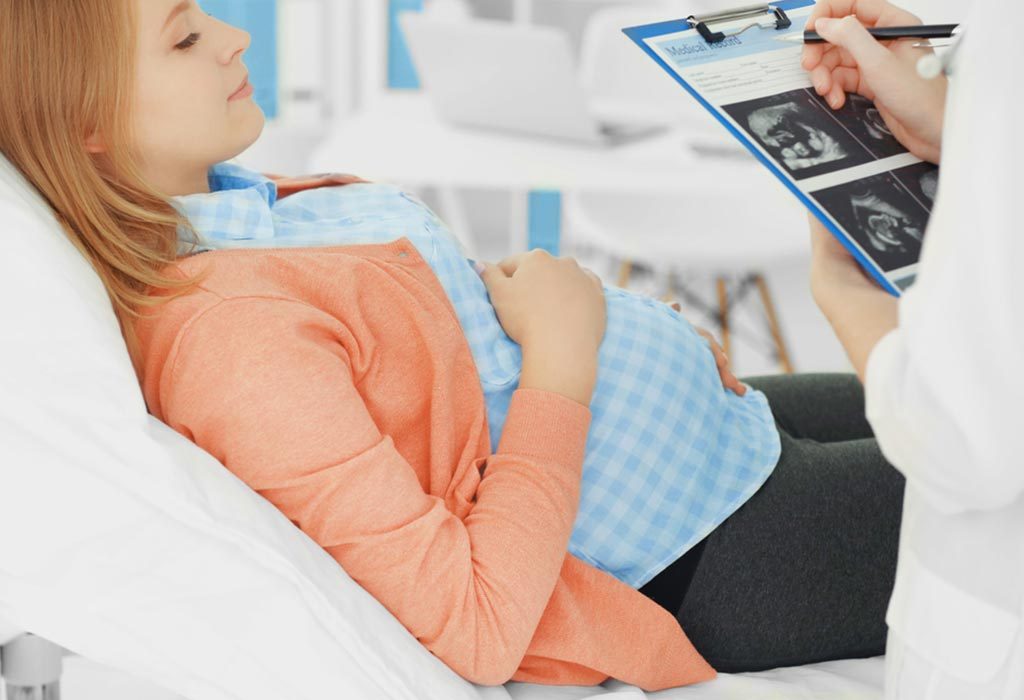In this Article
During the sixth month of your pregnancy, you are just a trimester away from actually holding your little one in your arms. Can you believe it? Well, yes you will because as you approach your third trimester, the initial signs of pregnancy like morning sickness will subside and instead you will start experiencing different symptoms.
Common 6th Month Pregnancy Symptoms
Here are some of the common symptoms at 6 months.
1. Constipation and Indigestion
Most women experience constipation along with heartburn throughout pregnancy. The cause for the same differs at different stages of pregnancy. Constipation experienced at the early stages of pregnancy is due to the changes in hormones, which slows down digestion due to loosening of the muscles around the bowel. As the months pass by, the enlargement of the uterus puts pressure on the bowels, leading to indigestion. Other reasons include taking multivitamin pills, which, again, tighten the stool, causing discomfort and bloating. In order to control the situation, you can exercise regularly, drink plenty of water, juices and other fluids and consume fibre-rich foods. Curd works wonderfully well in reducing constipation and indigestion. If you face extreme discomfort, speak to your doctor for laxatives.
2. Oedema
As you enter your last trimester you will experience swelling in your feet, ankles, and sometimes hands, too! As your body is preparing for the baby, it retains fluid in the tissues to nourish you and the baby, which causes this swelling. A bit of swelling around the eyes and cheeks is also normal, but if the swelling is accompanied with high protein levels, then it might be a sign of preeclampsia – a serious medical condition that causes blood pressure spikes. In order to avoid oedema try to keep your legs up whenever possible and avoid wearing tight clothes. Try not to stand for long periods.
3. Hunger Cravings and Increased Appetite
At this stage, you are not just eating for yourself, but also for your baby. The baby’s organs are developing, so your body needs to supply increased nutrients and vitamins. This is the reason why you will feel sudden hunger pangs and increased appetite around this time. So, it’s better to satisfy your urge without feeling guilty, but, at the same time, eat wisely. Choose healthy food options like fruits, salads, and whole-grain foods over junk foods. Drink plenty of water and have six to seven small portions of meals a day instead of three large ones.

4. Snoring
Many ladies experience snoring at this stage of pregnancy. Again, blame it on the pregnancy hormones. The weight gain causes your neck and head tissues to swell, leading to snoring, and additionally, your mucous membrane also swells. It’s better to use nasal strips while sleeping for better breathing. Snoring might also be an indication of gestational diabetes, which can be monitored through blood and urine tests.
5. Backache
Experienced by most of the ladies, backache starts from your initial stages of pregnancy and goes on till delivery; many times, continues even after delivery! The weight gain causes a backache, and also, as the uterus grows, it causes your lower back to curve. The relaxin hormone loosens your pelvic muscles to prepare the body for delivery, which again triggers a backache. Try to maintain a good posture while sitting and keep your legs up whenever possible.
Body Changes During the Sixth Month of Pregnancy
As mentioned earlier, now you finally look pregnant. Your six months pregnant belly will start showing. By now your body will also gain weight, and as the uterus pushes the abdomen, your belly button will also protrude and remain this way until a few weeks post-delivery. Due to the weight of the baby and the growing uterus, you might experience dizziness and light-headedness at times.
What Are Some Common Concerns in the Sixth Month of Pregnancy?
The common concerns ladies face during the sixth month of pregnancy are backaches, leg pain, foot cramps, swelling along with indigestion, constipation, and haemorrhoids. You might witness swelling around your feet and ankles and some even go up a shoe size. This swelling should settle within 6 weeks of delivery.
Every pregnancy has its own share of not so pleasant concerns, which include:
1. Itchiness Around the Abdomen
Around the middle of the 6th month of your pregnancy, you will experience itchiness around the abdomen. This happens because your baby is almost developed, and your skin starts stretching to accommodate the growing foetus and enlarged uterus. As a result, your skin becomes dry and starts itching. This is the perfect time to apply those creams and ointments for stretch marks to retain the moisture in your skin and reduce itchiness. Also, keep drinking lots of water to keep your skin hydrated.

2. Backache and Body Ache
Along with a backache, body ache will also start bugging you. You will feel more tired with each passing day. As the uterus grows, the ligaments from the pelvic area to the abdomen are stretched and put under extreme pressure, which causes lower tummy pain. The pain might continue for a few hours, but you must consult a doctor if it lasts for long and is followed by contractions.
3. Sleepless Nights
Most ladies experience insomnia around this time of the pregnancy, the reasons being hormonal changes, frequent visits to the washroom at night, and heartburn or indigestion. Moreover, when the baby kicks and flutters in the middle of the night, it’s obvious you might not be able to have a good night sleep. Some tips to avoid insomnia are to have your dinner 2-3 hours before bedtime and also be careful about what you eat. Secondly, follow a bedtime ritual like a relaxing breathing yoga, reading, listening to music, a warm water bath, etc. Sleep on a comfortable bed and correct room temperature.
4. Varicose Veins
Varicose veins are more or less hereditary and caused because the veins have to push extra blood to your uterus to meet the nutritional requirements of the growing baby. These veins, which look swollen and purple in colour around your thighs and under the knee area, are known as varicose veins. Exercise regularly and try to keep your feet up whenever possible. Also, wear comfortable innerwear and shoes.
Baby Development at the 6th Month of Pregnancy
A 6-month-old baby in the womb is almost fully grown and getting stronger day by day. His organs are still growing, and lungs are not completely developed. As the baby’s skin and muscles get matured, you can experience the baby’s movements in the form of kicks and squirms. Along with his weight increasing, he also grows in length and is now about a foot long. He starts reacting to sound. You can determine the foetus’ position with an ultrasound and see that the face of the baby is developed, and the head is in proportion to the body. He can even sense light and darkness by this time, and also starts developing white blood cells to fight against diseases. The face of the baby would be complete by now including his eyelashes, eyebrows, and hair. The growth of hair depends upon genetics and some babies are born with a lot of hair while some are totally bald.

6th-Month-Pregnancy Diet
It is better to avoid junk food and stick to cleanly cooked home-made stuff. Ensure that a continuous supply of folic acid, iron and calcium is being taken, as the baby needs nutrients to develop completely. 6th month of pregnancy food includes green leafy vegetables, nuts, fruits, and whole-grain foods in your diet for a steady flow of nutrients and minerals. Fruits like apricot, cherries, guava, grapes, berries, apple, mango, pineapple, etc. have a great amount of antioxidants and minerals. Vegetables like carrot, beetroot, spinach, pumpkins, tomatoes, onions, celery, broccoli, etc. are some highly recommended foods that you can include in your diet.
What to Expect During Your Visit to the Ob/Gyn
Once you enter your 6th month of pregnancy, the doctor visits will be more frequent. You might have to visit the doctor once every 3 weeks. The doctor will check the baby’s heart rate with a stethoscope. After this point, the doctor will check and measure the growth of the uterus, your limbs for swelling and varicose veins, and your body weight, and also recommend alterations to your diet, if required. If you are anaemic, or likely to be, the doctor may prescribe molybdenum along with other vitamins like iron, folic acid, B12, and copper.
Tests
You will be required to undergo the following tests during the 6th month of your pregnancy:
- Blood pressure check-up
- Weight measurement
- Urine test for measuring protein and sugar
- Gestational diabetes test wherein you will be asked to drink a glass of glucose water and blood test will be done after 2 hours.
- Measuring the fundal height of the uterus
- Examining the foetus position and size of the uterus
- Examination of feet and limbs for any signs of varicose veins or swelling

Symptoms to Be Discussed With Your Doctor
An experienced and friendly doctor will always put you at ease, so you need to speak to the doctor in case you experience any of these cases:
- Severe bleeding from the anal lining, as this could be a sign of some serious illness.
- Bleeding from the vagina
- Experiencing pain during the passing of urine
- Continuous vomiting
- Bursting of the water bag
- Extreme discomfort or pressure on the lower pelvic area
- Less than 10 foetal movements in an hour.
- Extreme pain or prolonged pains in the abdomen area
- Severe pain in the lower back
- More than five contractions in an hour
To-Do List For Moms-To-Be
First and foremost, take good care of yourself.
- Regularly exercising will help you stay fit and active during your pregnancy. Try practising Kegel exercises.
- Get at least eight hours of sleep in a day.
- Try to sleep on your side in order to promote kidney functions and also to put less pressure on your rectum.
- Keep a relaxed body posture and try to keep your feet up whenever possible. It is better to take Vitamin B6 on prescription to reduce the ache on your hands and limbs.
- Get all the information and details about childbirth. Read articles on 6th-month-pregnancy precautions and childbirth. Don’t be scared. Try to go with the flow and not take things to heart.
- It is very important to keep your mind positive and relaxed. Practice breathing exercises, a warm water bath, listening to music, watching funny videos, and anything that makes you happy and relaxed.
Handy Tips For Dad-To-Be
As everybody focuses on the mommy-to-be once your pregnancy news is out, we must never forget that it’s an overwhelming feeling for the dad-to-be as well. It is very important that you share all the information and details with your hubby, too, as he has no one else to address his concerns to. You can start by explaining how he can be helpful and do things during your labour. It would be great if you two can attend the happy parenting seminars to prepare yourself for parenthood. Always try to visit the doctor together so that you both understand the situation well enough and can openly speak to the doctor. The dad-to-be’s active participation in your 6th-month pregnancy care plays a vital role in your journey together.

Indulge in fun topics together like discussing baby names or planning an adorable nursery for welcoming your little one. Time will fly past sooner than you can imagine, so just enjoy this phase of life without missing on a thing.
As every person is different from another, every pregnancy is different and unique! The tips and observations stated here are based on the experiences of various mothers and as per doctor’s observations. Make a note of all the unique symptoms of your pregnancy and share it with others. Don’t think too much and just relax and enjoy the incredible journey of motherhood!








